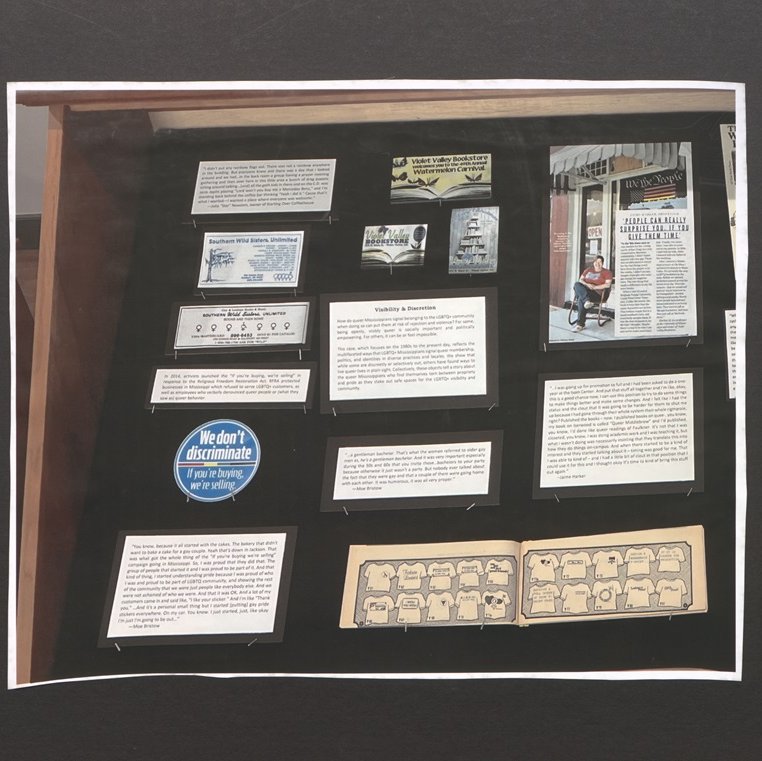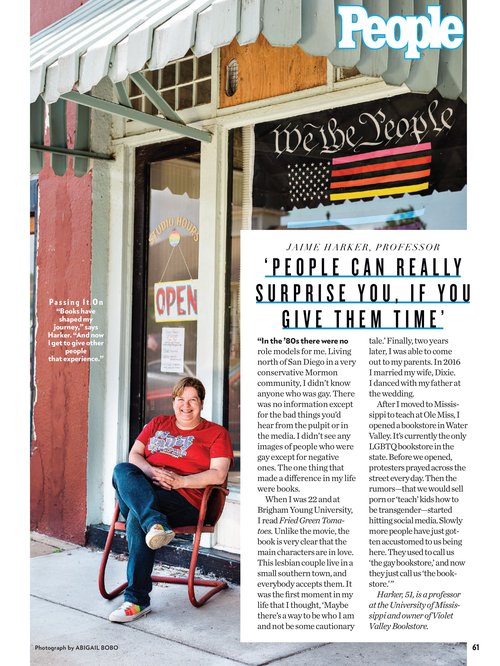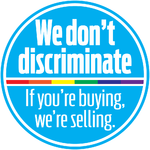Mississippians

New queer Mississippians signal belonging to the LGBTQ+ community when doing so can put them at risk of rejection and violence? For some, being openly, VISIBLY QUEER is socially important and politically empowering. For others, it can be or feel impossible.
This page, which focuses on the 1980s to the present day, reflects the multifaceted ways that LGBTQ+ Mississippians signal queer membership, politics, and identity in diverse practices and locales. We show that while some are DISCREETLY OR SELECTIVELY OUT, others have found ways to live queer lives in plain sight. Collectively, these objects tell a story about the queer Mississippians who find themselves torn between propriety and pride as they stake out safe spaces for the LGBTQ+ visibility and community.
Excerpts from Queer Mississippi Oral History Interviews
I didn't put any rainbow flags out. There was not a rainbow anywhere in the building. But everyone knew and there was a day and we had … in the back room a group having a prayer meeting gathering and then over here in this little area a bunch of drag queens sitting around talking… and all the goth kids in there and on the CD was Janis Joplin playing “Lord won't you buy me a Mercedes-Benz,” I'm standing back behind the coffee bar thinking “Yeah I did it.” Because that's what I wanted – I wanted a place where everyone was welcome. – Julia “Star” Newsom, owner of Starting Over Coffeehouse in Tupelo, Miss. (2019)
… a gentleman bachelor. That's what the women referred to older gay men, he’s a gentleman bachelor. And it was very important especially during the 50s and 60s that you invite these… bachelors to your party because otherwise it just wasn't a party. But nobody ever talked about the fact that they were gay and that a couple of them were going home with each. It was humorous, it was all very proper. – Moe Bristow (2019)
I was going up for promotion to full [professor] and I had been to do a one-year at the Isom Center. And put that stuff all together and I'm like, okay, this is a good chance now, I can use this position to try to do some things to make things better and make some changes. And I felt like I had the status and the clout that it was going to be harder for them to shut me up because I had gone through their whole their whole rigmarole, right? Published the books – now I published books on queer, you know my book on Isherwood is called “Queer Middlebrow” and I'd published, you know, I'd done like queer readings of Faulkner. It's not that I was closeted you know, I was doing academic work and I was teaching it, but what I was doing was necessarily insisting that they translate this into how they do things on-campus. And when there started to be a kind of interest and they started talking about it, timing was good for me. That I was able to kind of – and I had a little bit of clout in that position that I could use it for this and I thought okay it's time to kind of bring this stuff out again. – Jaime Harker (2018)

Image from People Magazine's My Coming Out (2020) shared over X.

In 2014, activists launched the “if you’re buying, we’re selling” in response to the Religious Freedom Restoration Act. RFRA protected businesses in Mississippi which refused to serve LGBTQ+ customers, as well as employees who verbally denounced queer people or [what they saw as] queer behavior. [Link to story in the Jackson Free Press, 2014-04-25]
You know, because it all started with the cakes. The bakery that didn't want to bake a cake for a gay couple. Yeah that's down in Jackson. That was what got the whole thing of the "If you're buying we're selling" campaign going in Mississippi. So, I was proud that they did that. The group of people that started it and I was proud to be part of it. And that kind of thing, I started understanding pride because I was proud of who I was and proud to be part of LGBTQ community, and showing the rest of the community that we were just people like everybody else. And we were not ashamed of who we were. And that it was OK. And a lot of my customers came in and said like, "I like your sticker." And I'm like "Thank you." ... And it's a personal small thing but I started [putting] gay pride stickers everywhere. On my car. You know. I just started, just, like okay I'm just I'm going to be out. – Moe Bristow (2019)
